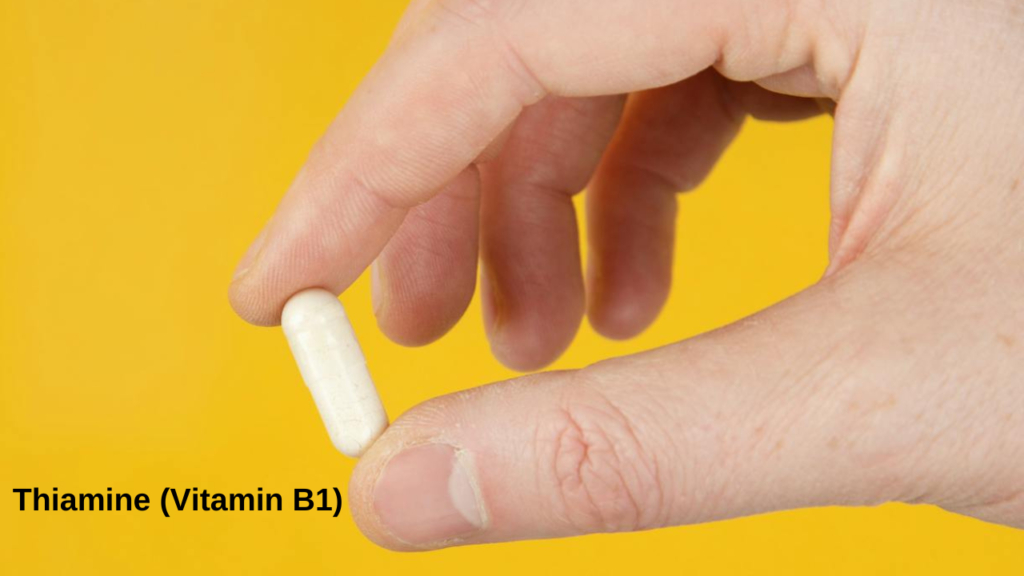Table of Contents
ToggleThiamine (vitamin B1)
Imagine your body as a vibrant metropolis, teeming with life. Within this bustling city, countless microscopic factories – your cells – work tirelessly to sustain existence. To keep these cellular powerhouses humming, a constant supply of energy is paramount. Understanding the benefits of thiamine is crucial, as it plays the role of the spark plug, igniting the biochemical reactions that convert the fuel we consume into the energy that fuels every cell, every thought, every heartbeat.
A Symphony of Life: Exploring the Benefits of Thiamine
Thiamine’s influence extends far beyond energy production. It orchestrates a symphony of bodily functions:
- Cellular Metabolism: The Engine Room: At the core of thiamine’s importance lies its role in cellular metabolism. It serves as a crucial component of several key enzymes, acting as catalysts in the intricate process of converting carbohydrates into glucose – the primary fuel source for our cells. Without sufficient thiamine, this vital energy-generating process falters, leaving cells starved for the fuel they need to thrive. This highlights one of the key benefits of thiamine – supporting efficient energy production at the cellular level.
- Nerve Function: The Communication Network: Thiamine plays a pivotal role in maintaining the health of our nervous system, the intricate network that connects our brain to every corner of our body. It ensures that messages travel swiftly and accurately along nerve pathways, allowing us to think, feel, and move with grace and precision. This underscores another significant benefit of thiamine – supporting optimal nerve function and communication.
- Brain Health: The Cognitive Spark: Emerging research points to a profound connection between thiamine and brain health. Adequate thiamine levels are not only essential for cognitive function and memory but also play a crucial role in mood regulation. Studies are exploring its potential to safeguard against neurodegenerative diseases such as Alzheimer’s. This emphasizes a key benefit of thiamine – its potential to support cognitive health and protect against age-related cognitive decline.
- Heart Health: The Rhythm of Life: Thiamine plays a vital role in supporting the tireless work of our heart. It contributes to the health of the heart muscle itself, ensuring it can beat with strength and rhythm. Furthermore, thiamine may play a role in regulating blood pressure, contributing to a healthy cardiovascular system. This highlights another important benefit of thiamine – supporting cardiovascular health.
Who is at Risk for Thiamine Deficiency?
While most individuals obtain sufficient thiamine through a balanced diet, certain groups may be at increased risk of deficiency:
- The Burden of Alcohol: Alcohol consumption can significantly disrupt the delicate balance of thiamine within the body. It interferes with the absorption and utilization of this vital nutrient, potentially leading to serious neurological consequences.
- The Diabetic Dilemma: Individuals with diabetes, particularly type 2 diabetes, may experience increased excretion of thiamine, leading to lower levels within the body.
- The Aging Body: As we age, our bodies may become less efficient at absorbing thiamine from the foods we consume. Additionally, certain medications commonly used by older adults can interfere with thiamine absorption.
- The Digestive Challenge: Conditions like inflammatory bowel disease (IBD) can disrupt the delicate balance of the digestive system, impairing the absorption of essential nutrients, including thiamine.
Recognizing the Signs of Thiamine Deficiency:

Thiamine deficiency, a condition medically known as beriberi, can manifest in a variety of ways:
- The Languor of Fatigue: Feeling persistently tired and lacking energy is a common hallmark of thiamine deficiency.
- Neurological Disruptions: This can encompass a range of symptoms, including muscle weakness, difficulty walking, tingling or numbness in extremities, and even cognitive difficulties and mental confusion.
- The Heart Under Strain: In severe cases, thiamine deficiency can place a significant burden on the heart, potentially leading to an enlarged heart or even heart failure.
Nourishing Your Body with Thiamine:
- A Dietary Symphony: Incorporate thiamine-rich foods into your daily diet. Excellent sources include:
- Fortified cereals and bread
- Lean meats, such as pork and poultry
- Legumes, such as beans and lentils
- Whole grains, such as brown rice and quinoa
- Nuts and seeds
- The Role of Supplementation: In some instances, your healthcare provider may recommend thiamine supplements.
Prioritize Safety and Efficacy: Always seek guidance from a healthcare provider before starting any new supplement regimen to ensure it’s right for you.
Disclaimer: This article is for informational purposes only and should not be considered medical advice. Always consult with a qualified healthcare professional for personalized guidance on dietary supplements and any health concerns you may have.

